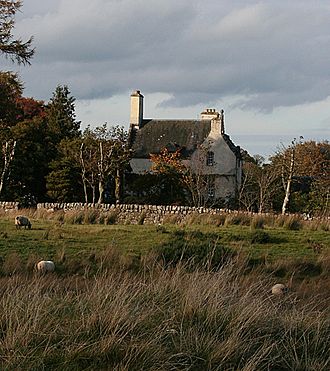Bavelaw Castle facts for kids
Quick facts for kids Bavelaw Castle |
|
|---|---|
 |
|
| General information | |
| Coordinates | 55°51′04″N 3°19′54″W / 55.8510715°N 3.3315396°W |
Bavelaw Castle is an old, important house located in the City of Edinburgh area of Scotland. It sits among the beautiful Pentland Hills, not far from Penicuik and Balerno. This castle is considered a very special historic building, officially listed as a Category A listed building since 1971.
Contents
History
Who Lived Here?
Bavelaw Castle has a long and interesting past, with many different families owning it over the centuries. An earlier building on this spot was first owned by the Braids, then by the Fairlies. Later, it passed to the Forrester family through marriage. In the 1500s, it became the property of the Mowbrays of Barnbougle.
Royal Visits
In 1628, King James VI gave the areas of Easter and Wester Bavelaw to Laurence Scott of Harperrig. Before this, a special type of castle called an L-plan tower house had been built by Walter Dundas in the 1500s. Both Mary, Queen of Scots, and King James VI are said to have stayed at Bavelaw. They supposedly used it as a place to stay when they went hunting.
Changes Over Time
After Laurence Scott took over, he made the tower house bigger. He might have added a small section on the southeast side. Over time, Bavelaw Castle fell into disrepair and became quite ruined.
However, it was brought back to life in 1900 by a famous architect named Sir Robert Lorimer. He fixed up the castle and added new parts. He connected the old out-buildings to the main house, put in bigger windows, and added a small tower (called a turret) to make more space in the attic. He also changed the basement area. The building was updated again in 1938 by the architectural company Dick Peddie & McKay.
Description
What Does It Look Like?
Bavelaw Castle is built with rough stone walls that are covered in a special plaster called harled rubble. The main part of the tower is three storeys (or floors) tall, not counting the attic at the very top.
A round tower sticks out from the northeast corner of the main building. There's also a small, one-story section that was added later on the southeast side.
Inside the Castle
The rooms on the ground floor of the tower have special arched ceilings, which are called vaulted ceilings. The room on the northern side of the ground floor is a bit lower than the other one. This difference in height might mean that this northern room was part of the very first building here. This height difference continues on the floors above. The northern room on the first floor is famously known as Queen Mary's Room, perhaps because of her visits.

